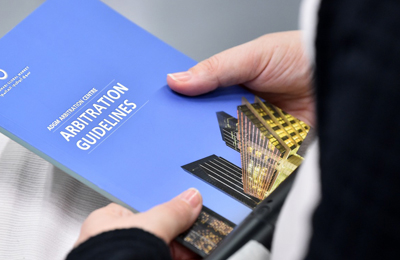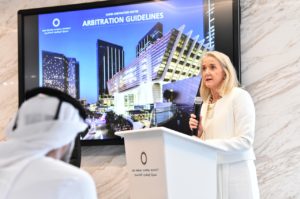ADGMAC publishes Arbitration Guidelines

The Guidelines offer parties best practice procedures to assist in bringing greater certainty and efficiency to the arbitral process.
Abu Dhabi Global Market Arbitration Centre (ADGMAC) has launched a set of Arbitration Guidelines with unique and innovative characteristics that offer parties best practice procedures to assist in bringing greater certainty and efficiency to the arbitral process. This is part of ADGMAC’s ongoing commitment to raise the level of global arbitration practice and standards.
The Guidelines were developed following extensive consultation with a wide cross-section of the dispute resolution community, including senior in-house counsel from leading Abu Dhabi organisations, local and international law firms and arbitrators. The Guidelines ensure fairness, equality and due process and address users’ primary concerns, needs and interests in the arbitral process.
The Guidelines are available to all and can be applied at any stage of an arbitration. They have been structured in “modules”, each of which deals with certain aspects of the arbitral process through a set of clear default procedures, giving tribunals the tools to better control time and costs of proceedings.
The Guidelines can be used in ad hoc arbitral proceedings or proceedings that are administered by an arbitral institution. They are designed to complement the leading institutions’ arbitration rules. They are not intended to replace or override the institutional rules that the parties have chosen for their arbitration or the provisions of the arbitration law of their chosen arbitral seat.
 Linda Fitz-Alan, registrar and chief executive of ADGM Courts, said, “Following the enactment of ADGM’s progressive arbitration framework in late 2015, we have explored ways in which we could transform all aspects of dispute resolution. We have listened to the concerns expressed by experienced members of the arbitration community about the trend towards higher costs, increased inefficiencies and longer delays in the arbitral process, and agree that this is unsustainable for parties involved in that process. After wide consultation we have identified a universal set of best practice guidelines that parties and tribunals can adopt or tailor to the circumstances of a particular case. We believe that the guidance that they offer will be of immense assistance in promoting greater efficiency, particularly in proceedings involving parties from different legal systems and traditions. This is just one of a number of steps we are taking to demonstrate our leadership in the delivery of innovative solutions and services in dispute resolution.”
Linda Fitz-Alan, registrar and chief executive of ADGM Courts, said, “Following the enactment of ADGM’s progressive arbitration framework in late 2015, we have explored ways in which we could transform all aspects of dispute resolution. We have listened to the concerns expressed by experienced members of the arbitration community about the trend towards higher costs, increased inefficiencies and longer delays in the arbitral process, and agree that this is unsustainable for parties involved in that process. After wide consultation we have identified a universal set of best practice guidelines that parties and tribunals can adopt or tailor to the circumstances of a particular case. We believe that the guidance that they offer will be of immense assistance in promoting greater efficiency, particularly in proceedings involving parties from different legal systems and traditions. This is just one of a number of steps we are taking to demonstrate our leadership in the delivery of innovative solutions and services in dispute resolution.”
Essam Al Tamimi, senior partner, Al Tamimi & Co. said, “The Arbitration Guidelines, which have been published by the ADGM Arbitration Centre, provide an innovative, and yet practical, set of procedures for use in arbitral proceedings, whether seated in the ADGM or elsewhere. Parties who choose to utilize them – in whole or in part – have the assurance that they represent best practice and afford greater certainty and efficiency, factors that ought to appeal to end-users of arbitration. And, of course, the Guidelines represent another step by the UAE in cementing its position as a centre of excellence for arbitration in the region.”
Alex B evan, partner, International Arbitration, Shearman & Sterling, said, “Arbitration must continue to evolve and innovate in order to strive to serve the end-users and their businesses even better than it already does. The Guidelines are an important step forward on that path of innovation. We are delighted to have developed the Guidelines with ADGMAC and we are excited at the prospect of parties, counsel and arbitrators making use of them to make the arbitral process more fit for purpose and cost effective.”
evan, partner, International Arbitration, Shearman & Sterling, said, “Arbitration must continue to evolve and innovate in order to strive to serve the end-users and their businesses even better than it already does. The Guidelines are an important step forward on that path of innovation. We are delighted to have developed the Guidelines with ADGMAC and we are excited at the prospect of parties, counsel and arbitrators making use of them to make the arbitral process more fit for purpose and cost effective.”
Henry Quinlan, head of litigation, Arbitration & Investigations, DLA Piper Middle East LLP, said, “From the outset, ADGM has sought to engage constructively with its sister courts, the legal profession and with court and arbitration users to ensure that the services it is offering are relevant and address the issues which arise in dispute resolution in the UAE and the wider region. The Guidelines represent another example of the fruitful outcomes which can be achieved by this consultative approach. They also demonstrate the ADGMAC’s continuing desire both to listen and, having listened, to provide thought leadership to the profession, to other institutions and to users of arbitration. The Guidelines are brimful of innovative and thought-provoking ideas which should serve as triggers to parties, counsel and tribunals to tailor the arbitral process to make it work for them in the specific context of their dispute. “Bespoking” the arbitral process is precisely the type of innovation which is required if arbitration is to remain a relevant and useful method of dispute resolution, particularly now, when technologies are emerging which will challenge present notions of how disputes should be resolved.”
For more information and to view the Guidelines, please visit














































































































